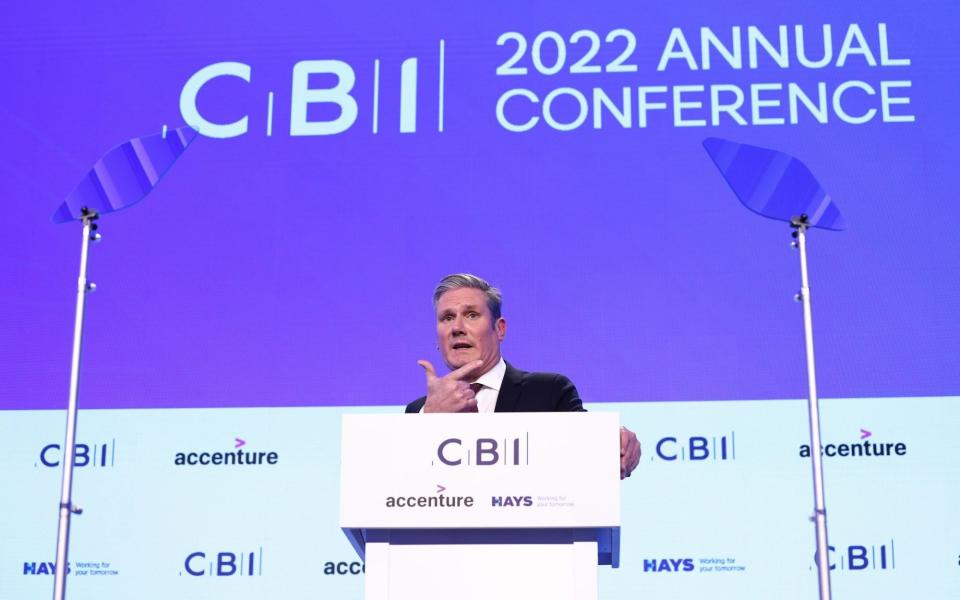Britain’s record migration figures “should shock all of us,” Sir Keir Starmer claimed on Thursday, as the latest data revealed net migration hit a high of nearly one million last year.
At a hastily organised Downing Street press conference, the Prime Minister said Brexit had turned Britain into “an open borders experiment”. He accused the Conservatives of allowing migration levels to get “completely out of control,” with figures quadrupling since 2019, the year before Brexit legislation was enacted, and net migration reaching 906,000 in 2023. This was driven by people from outside the EU coming to the UK on work or study visas.
“Failure on this scale isn’t just bad luck. It isn’t a global trend or taking your eye off the ball. No, this is a different order of failure. This happened by design, not accident,” Starmer said. He has also repeatedly criticised the Conservatives’ record on small boat crossings.
But the PM has, on many previous occasions, adopted a somewhat softer stance on migration, including voting against stricter asylum measures 14 times while in opposition between 2015 and 2022, according to an analysis by the Henry Jackson Society. He never voted in favour of stricter measures. In particular, before becoming Labour leader, Starmer was vocal about maintaining free movement between the UK and the EU as the former separated itself from the bloc. He has since ruled out any return to freedom of movement.
Tory critics have meanwhile accused Starmer, who in 1988 wrote in an edition of the magazine Socialist Lawyer that “there is a racist undercurrent which permeates all immigration law”, of hypocrisy on migration. Neil O’Brien, the Conservative MP, said on Thursday: “[Starmer] previously said all immigration law was racist. He’s full of BS.” Here’s why:
November, 2022

A prospective Labour government was “not going to hold business back” if employers needed “talent from abroad,” Starmer said after addressing the Confederation of British Industry, having also called for an end to the days of “cheap labour” and for the UK to be weaned off its “immigration dependency”.
When asked whether his party would cut migration levels, if elected, he said he did not want to be tied to “arbitrary” numbers. “Over the last few years, we’ve had arbitrary figures plucked out of the air, and that hasn’t worked for anyone,” he told the BBC, promising a “pragmatic” approach to immigration instead.
September 2020
Starmer told Times Radio that “family members [from other countries] should be able to live together” in Britain, and that the nation “couldn’t function” without the flow of people seeking work here.
January 2020
Just hours before the UK officially left the EU, Starmer, then shadow Brexit secretary, told an audience that “we have to make the case for the benefits of migration, the benefits of free movement.” When asked whether this would entail freedom of movement later being reinstated, he responded, “Of course, bring back, argue for, challenge [the ruling]”, with the promise to “defend free movement as we leave the EU”.
January 2020
Labour for Free Movement, a group of party members campaigning for the extension of free movement, sent a questionnaire to all prospective Labour leaders – after Jeremy Corbyn announced he would step down following defeat in the December 2019 general election – asking them to outline their stance on the issue. Starmer was the first to respond, saying: “I will always defend migrants’ rights and make the positive case for immigration… I believe that should be protected as we leave the EU, and I am very concerned at the impact that [Boris] Johnson’s plans to end free movement will inevitably have on our economy, migrants’ rights and the freedom for people to work and live in the EU 27.”
February 2019
In a Newsnight interview, Starmer said that Britain should “explore” qualified free movement of EU workers. “If somebody is coming to do a job and it needs to be done and it has been advertised locally beforehand with nobody able to do it, then most people would say ‘I accept that.’”
September 2018

Starmer told the Labour conference in Liverpool that “nobody is ruling out Remain as an option.” He then argued for Article 50, the legal process for leaving the EU, to be extended should then-prime minister Theresa May’s Brexit deal be voted down.
December 2017
The year after the Brexit referendum, Starmer conceded that “freedom of movement can’t stay the same. The status quo is not an option.” Still, he argued that migration to and from the EU should be “negotiated… the end of free movement doesn’t mean no movement.”
April 2017
“We recognise that immigration rules will have to change as we exit the EU, but we do not believe that immigration should be the overarching priority,” Starmer said when revealing Labour’s Brexit strategy.
September 2015
A few months after being elected as the MP for Holborn and St Pancras, Starmer tweeted a government petition entitled: “Accept more asylum seekers and increase support for refugee migrants in the UK,” pushing for public support as “we need urgent action to take refugees and review ineffective asylum rules.”
A Labour spokesperson told The Telegraph on Friday: “The Tories turned Britain into a one-nation experiment in open borders.
“In Kemi Badenoch’s own words, the Tories broke the immigration system. This Labour government is picking up the pieces, fixing the foundations and delivering on British people’s priorities.
“Labour is reforming the points-based immigration system, cracking down on visa abuse, and linking skills and training to the economy – so that we can drive down net migration, which has been too high for too long.”
EMEA Tribune is not involved in this news article, it is taken from our partners and or from the News Agencies. Copyright and Credit go to the News Agencies, email news@emeatribune.com Follow our WhatsApp verified Channel




